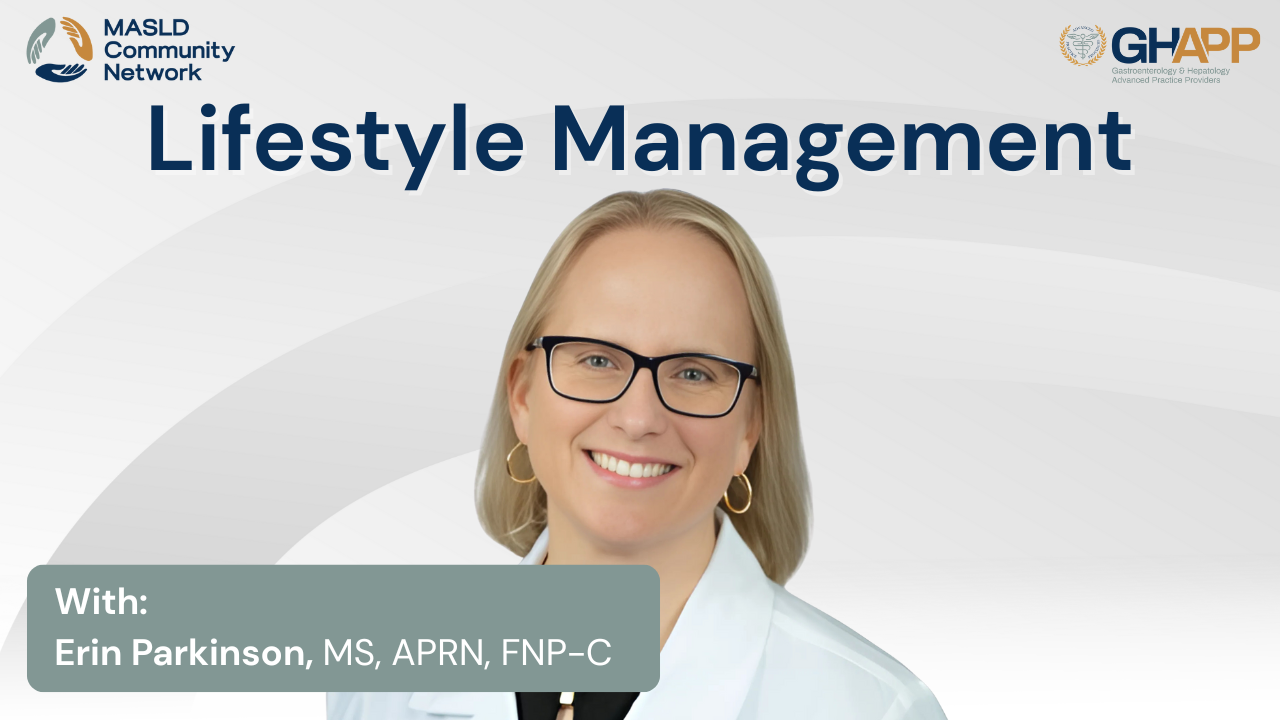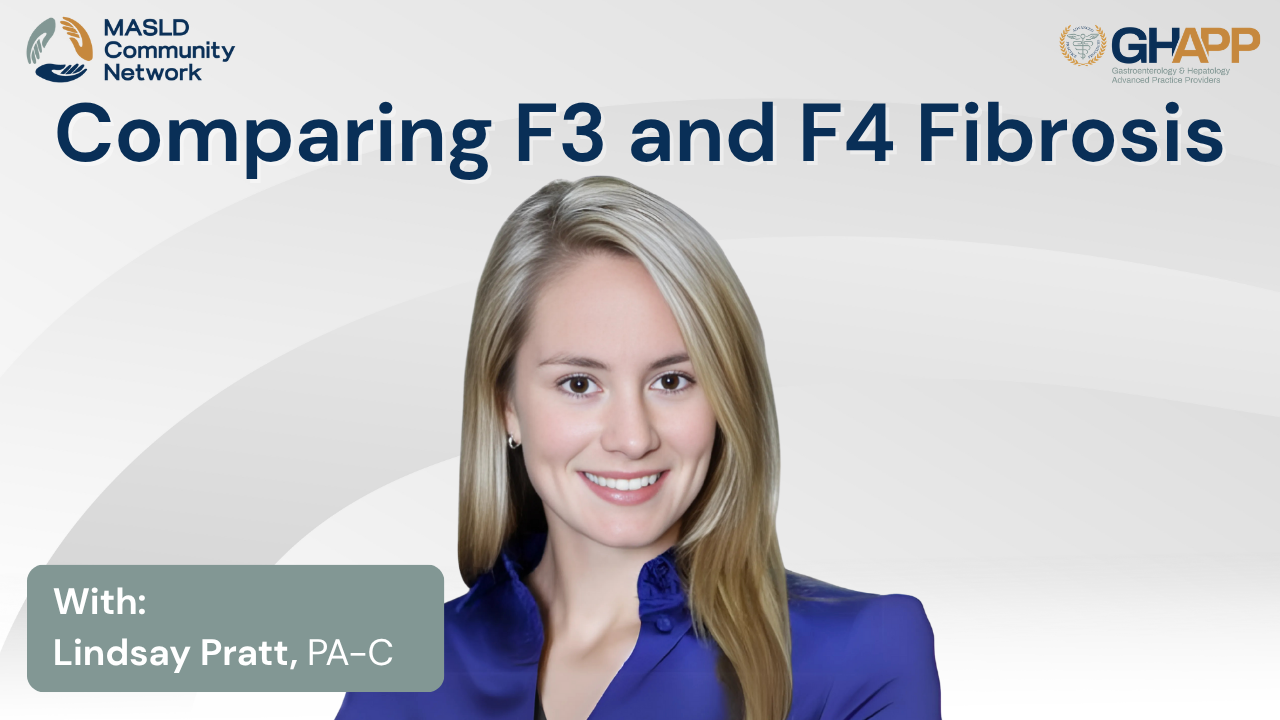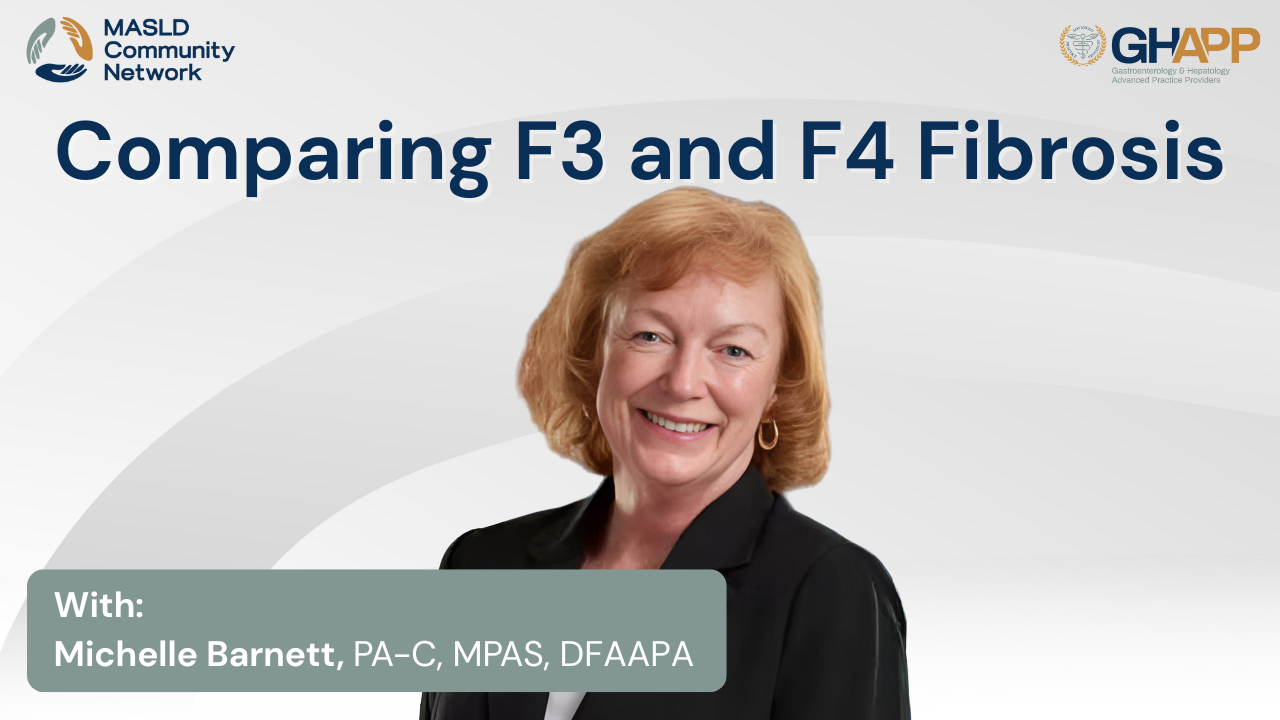MASLD Pharmacotherapy With Jordan Mayberry
Chat with MASLD AI

Hi, I am MASLD AI.
Suggested Questions :

MASLD AI 06:56 AM

Join Jordan Mayberry, MPAS, PA-C from UT Southwestern, for an insightful session from the GHAPP MASLD/MASH Community Network focused on the evolving landscape of pharmacotherapy in MASLD and MASH. This presentation explores evidence-based strategies for treating metabolic dysfunction–associated steatotic liver disease (MASLD), with an emphasis on weight loss, diabetes management, and liver-directed therapies. Jordan breaks down key data on GLP-1 receptor agonists, SGLT2 inhibitors, Vitamin E, pioglitazone, and highlights the latest clinical evidence supporting the use of Resmetirom—the first FDA-approved treatment for MASH with stage 2 or 3 fibrosis. Learn how these therapies fit into hepatology practice, including clinical considerations, side effect management, and patient selection. Stay up to date on ongoing research, treatment duration, and real-world application of these new therapies. Don’t forget to register and join the GHAPP MASLD/MASH Community Network for continued education and access to valuable resources.
Related Webcast

Lifestyle Management With Michelle Barnett

Join Michelle Barnett, PA-C, for an in-depth clinical case presentation as part of the GHAPP MASLD Community Network. With over 25 years of experience in GI and hepatology, Michelle walks through the real-world management of Albert, a 65-year-old patient newly diagnosed with MASLD (Metabolic Dysfunction-Associated Steatotic Liver Disease). In this session, she outlines key diagnostic criteria, the role of non-invasive tests (NITs) like FIB-4 and FibroScan, and how to risk-stratify patients using updated care pathways. Learn how to differentiate low-, moderate-, and high-risk cases and when to refer for hepatology evaluation or consider biopsy. Michelle also explores the clinical role of Resmetirom—the first FDA-approved medication for patients with MASH and F2-F3 fibrosis—and emphasizes the importance of sustained lifestyle modification, dietary change, and exercise in liver disease management. This expert discussion includes cultural and socioeconomic considerations, adherence strategies, and patient tools like the Exercise and Diet Adherence Scale. Visit the GHAPP MASLD Community Network for more resources, disease-state education, and updates on the evolving care landscape. Educational content supported by Madrigal Pharmaceuticals.
Watch Now

Lifestyle Management With Erin Parkinson

In this impactful session from the GHAPP MASLD Community Network, Erin Parkinson, NP, explores the vital role of lifestyle modifications in the management of MASLD (Metabolic dysfunction-associated steatotic liver disease) and MASH (Metabolic dysfunction-associated steatohepatitis). Through the lens of a real-world case study, Erin illustrates how clinical tools like FIB-4 and FibroScan® can be used to assess fibrosis risk and guide interventions for patients presenting with metabolic syndrome and hepatic steatosis. With a focus on practical, personalized care, this presentation highlights how diet, exercise, and culturally sensitive counseling can meaningfully reduce hepatic fat, inflammation, and fibrosis—key factors in preventing progression to cirrhosis or hepatocellular carcinoma. Erin discusses the impact of processed foods, high-fructose corn syrup, and sedentary behavior, while offering actionable guidance on introducing Mediterranean diets, intermittent fasting, and realistic exercise goals tailored to individual readiness and barriers. Whether you're a hepatology specialist, primary care provider, or obesity medicine clinician, this talk delivers tools to better support patients with MASLD/MASH through sustainable behavioral change and longitudinal follow-up.
Watch Now

Non-Invasive Testing With Janet Gripshover

In this in-depth and practical discussion, Janet Gripshover, NP from Cedars-Sinai in Los Angeles, explores the evolving role of non-invasive testing (NITs) in the diagnosis and risk stratification of MASLD (Metabolic dysfunction-associated steatotic liver disease) and MASH (Metabolic dysfunction-associated steatohepatitis). Drawing from real-world experience and a case study involving a 65-year-old patient with multiple cardiometabolic risk factors, she breaks down the latest 2025 approaches to fibrosis assessment—highlighting the use of FIB-4, ELF score, vibration-controlled transient elastography (FibroScan®), and MR elastography. Gryover also emphasizes how combining tests across modalities can improve accuracy and patient care while avoiding the risks of liver biopsy. Learn how liver stiffness, lab values, and clinical history all intersect to guide care and treatment decisions in patients with fatty liver disease. This session is part of the MASLD/MASH Community Network and is ideal for providers, specialists, and anyone interested in the forefront of liver disease management.
Watch Now

MASLD Basics With Summer Collier

Join Summer Collier, NP from UC San Diego Health, for an essential overview of MASLD (Metabolic Dysfunction-Associated Steatotic Liver Disease) in this GHAPP MASLD Community Network session. Designed for clinicians and healthcare professionals, this case-based talk covers the evolving nomenclature shift from NAFLD/NASH to MASLD/MASH, including key definitions, diagnostic criteria, and practical tools for identifying and managing patients with steatotic liver disease. Summer walks through foundational concepts like the role of hepatic steatosis, cardio-metabolic risk factors, and the importance of excluding significant alcohol use to establish a MASLD diagnosis. She also provides clinical insights into non-invasive fibrosis staging using FIB-4, FibroScan, elastography, and blood-based tests, as well as how to differentiate patients who may require hepatology referral or biopsy. Emphasizing the importance of early detection and risk stratification in primary care, this session highlights how fibrosis stage impacts prognosis, treatment planning, and long-term liver-related outcomes. For more educational sessions and MASLD tools — visit the GHAPP MASLD Community Network.
Watch Now

Comparing F3 and F4 Fibrosis With Lindsay Pratt

Join Lindsey Pratt, PA-C from the University of Colorado Liver Transplant Program, for an in-depth clinical comparison of F3 and F4 fibrosis in patients with MASLD (Metabolic Dysfunction–Associated Steatotic Liver Disease) and MASH (Metabolic Dysfunction–Associated Steatohepatitis). Using an identical patient profile with differing non-invasive testing results, Lindsey demonstrates how to accurately stage fibrosis using tools like FIB-4, FibroScan, CAP score, and ELF test—emphasizing when pharmacologic intervention is appropriate and when advanced monitoring becomes critical. This session explores the clinical implications of fibrosis staging, treatment pathways including resmetirom (Rezdiffra), the role of GLP-1 receptor agonists, and practical nutrition and lifestyle strategies. For F4 patients, Lindsey outlines key elements of surveillance for hepatocellular carcinoma (HCC), portal hypertension management, and transplant evaluation. Whether you're in hepatology or primary care, this case-based discussion offers evidence-backed guidance for managing patients across the MASLD/MASH spectrum and preventing liver disease progression.
Watch Now

Non-Invasive Testing With Jordan Mayberry

In this educational session, Jordan Mayberry, PA-C from UT Southwestern, presents a practical overview of non-invasive testing for diagnosing and staging metabolic dysfunction-associated steatotic liver disease (MASLD) and metabolic-associated steatohepatitis (MASH). Using a real-world patient case, Jordan discusses how clinicians can leverage key tools—such as FIB-4, ELF testing, FibroScan (VCTE), and MRI elastography—to assess fibrosis and stratify risk in patients with MASLD. She explains the benefits, limitations, and clinical applications of each modality, including guidance on when and how to use them in everyday practice. Whether you're a hepatology specialist or a provider managing patients with cardiometabolic risk factors, this talk delivers a clear, step-by-step approach to incorporating non-invasive liver assessment into your workflow. Viewers are also invited to explore the GHAPP MASLD/MASH Community Network for ongoing education, resources, and clinical insights.
Watch Now

MASLD Pharmacotherapy

In this dynamic and highly informative session, Sherona Bau, NP, presents a comprehensive overview of pharmacotherapy in MASLD and MASH, breaking down current treatment strategies and emerging therapies for patients with metabolic dysfunction-associated steatotic liver disease. This presentation, part of the MASLD/MASH Community Network, begins by contextualizing the recent nomenclature shift from NAFLD/NASH to MASLD/MASH and its clinical implications. Sherona explores lifestyle intervention targets, including Mediterranean diet, weight loss goals based on fibrosis stage, and the role of GLP-1 and GIP receptor agonists in improving liver health. She highlights the ESSENCE trial results for semaglutide, discusses the only FDA-approved therapy to date—resmetirom (Rezdiffra)—and explains its mechanism of action via thyroid hormone receptor beta activation. The session dives deep into efficacy data from the MAESTRO-NASH trial, side effect profiles, drug–drug interactions, and monitoring recommendations. She also previews a pipeline of promising agents in phase 2 and 3 trials—including tirzepatide (GLP-1/GIP), cotadutide (GLP-1/GR), pemvidutide (GLP-1/GIP), and retatrutide (GLP-1/GIP/GR)—offering insight into what’s next in the evolving treatment landscape. This is a must-watch for hepatology and endocrinology clinicians focused on the future of fatty liver management.
Watch Now

Non-Invasive Testing With Sherona Bau

In this engaging and highly informative GHAPP MASLD Community Network session, Sherona Bau, PA-C, walks attendees through a practical overview of non-invasive testing (NIT) for evaluating liver health in patients with MASLD (Metabolic dysfunction-associated steatotic liver disease) and MASH (Metabolic dysfunction-associated steatohepatitis). Drawing on real-world clinical experience, Sherona explains why non-invasive testing is essential for identifying fibrosis risk in a population where liver steatosis is prevalent in up to 30% of U.S. adults. Through the case of a 65-year-old Hispanic male named Albert, Sherona demonstrates how to interpret and apply tools such as FIB-4, FibroScan (VCTE and CAP score), ELF (Enhanced Liver Fibrosis) test, and MR Elastography (MRE). She highlights their respective strengths, limitations, clinical cut-offs, and insurance-related considerations. The session also covers when to order tests, how to assess data quality (e.g., IQR/median ratio in VCTE), and when to escalate care to hepatology or cardiology. Whether you are a primary care provider, endocrinologist, or hepatology specialist, this talk delivers practical algorithms and decision-making pathways for managing MASLD, improving early detection of fibrosis and cirrhosis, and integrating cardiovascular risk assessment into liver care. Sherona also emphasizes the importance of alcohol use history, metabolic syndrome risk factors, and annual NIT follow-up in patients at risk for disease progression.
Watch Now

Lifestyle Management With Anthony Derencius

Join Anthony Derencius, PA-C, at Pinnacle Clinical Research, for an in-depth, case-based discussion on the role of lifestyle management in MASH and MASLD. In this educational session from the GHAPP MASLD Community Network, Anthony walks through the real-world case of a 65-year-old patient with obesity, diabetes, and suspected metabolic liver disease, highlighting how to interpret non-invasive diagnostics like FIB-4 scores and transient elastography. He explains the clinical significance of metabolic risk factors, genetic predispositions (such as PNPLA3), and how personalized approaches to nutrition and exercise can alter the progression of fatty liver disease. With evidence-based insights on the Mediterranean diet, aerobic vs resistance training, and behavior change strategies, this video offers frontline strategies to support patients in reversing or slowing fibrosis. Watch to learn how providers can combine patient education, lifestyle interventions, and emerging pharmacotherapy to manage MASLD and MASH more effectively. Educational support provided by Madrigal Pharmaceuticals. For more disease state content, visit the GHAPP MASLD Community Network.
Watch Now

Comparing F3 and F4 Fibrosis With Michelle Barnett

In this installment of the GHAPP MASLD Community Network, Michelle Barnett, PA-C from Peak Gastroenterology in Colorado Springs, presents a deep dive into the clinical management of MASH—formerly known as NASH or non-alcoholic steatohepatitis. Through two comparative case studies, Michelle explores the nuances of diagnosing and managing patients with F3 and F4 fibrosis. Learn how to effectively use non-invasive diagnostic tools like FIB-4, FibroScan, and ELF testing, and gain valuable insights into stratifying fibrosis risk, monitoring hepatocellular carcinoma (HCC), and determining when resmetirom is appropriate. This session also covers practical guidance on nutrition, exercise, medication safety, and multidisciplinary care for patients with advanced liver disease. Whether you're a hepatology specialist or a primary care provider navigating the MASLD/MASH landscape, this video offers actionable strategies to improve long-term patient outcomes and reinforces the critical role of lifestyle intervention and liver disease surveillance.
Watch Now





 July 2025
July 2025 